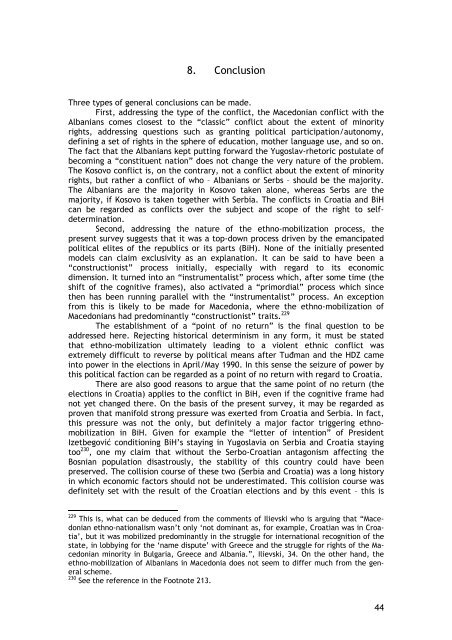Synthetic report - EURAC
Synthetic report - EURAC
Synthetic report - EURAC
Create successful ePaper yourself
Turn your PDF publications into a flip-book with our unique Google optimized e-Paper software.
8. Conclusion<br />
Three types of general conclusions can be made.<br />
First, addressing the type of the conflict, the Macedonian conflict with the<br />
Albanians comes closest to the “classic” conflict about the extent of minority<br />
rights, addressing questions such as granting political participation/autonomy,<br />
defining a set of rights in the sphere of education, mother language use, and so on.<br />
The fact that the Albanians kept putting forward the Yugoslav-rhetoric postulate of<br />
becoming a “constituent nation” does not change the very nature of the problem.<br />
The Kosovo conflict is, on the contrary, not a conflict about the extent of minority<br />
rights, but rather a conflict of who – Albanians or Serbs – should be the majority.<br />
The Albanians are the majority in Kosovo taken alone, whereas Serbs are the<br />
majority, if Kosovo is taken together with Serbia. The conflicts in Croatia and BiH<br />
can be regarded as conflicts over the subject and scope of the right to selfdetermination.<br />
Second, addressing the nature of the ethno-mobilization process, the<br />
present survey suggests that it was a top-down process driven by the emancipated<br />
political elites of the republics or its parts (BiH). None of the initially presented<br />
models can claim exclusivity as an explanation. It can be said to have been a<br />
“constructionist” process initially, especially with regard to its economic<br />
dimension. It turned into an “instrumentalist” process which, after some time (the<br />
shift of the cognitive frames), also activated a “primordial” process which since<br />
then has been running parallel with the “instrumentalist” process. An exception<br />
from this is likely to be made for Macedonia, where the ethno-mobilization of<br />
Macedonians had predominantly “constructionist” traits. 229<br />
The establishment of a “point of no return” is the final question to be<br />
addressed here. Rejecting historical determinism in any form, it must be stated<br />
that ethno-mobilization ultimately leading to a violent ethnic conflict was<br />
extremely difficult to reverse by political means after Tuđman and the HDZ came<br />
into power in the elections in April/May 1990. In this sense the seizure of power by<br />
this political faction can be regarded as a point of no return with regard to Croatia.<br />
There are also good reasons to argue that the same point of no return (the<br />
elections in Croatia) applies to the conflict in BiH, even if the cognitive frame had<br />
not yet changed there. On the basis of the present survey, it may be regarded as<br />
proven that manifold strong pressure was exerted from Croatia and Serbia. In fact,<br />
this pressure was not the only, but definitely a major factor triggering ethnomobilization<br />
in BiH. Given for example the “letter of intention” of President<br />
Izetbegović conditioning BiH’s staying in Yugoslavia on Serbia and Croatia staying<br />
too 230 , one my claim that without the Serbo-Croatian antagonism affecting the<br />
Bosnian population disastrously, the stability of this country could have been<br />
preserved. The collision course of these two (Serbia and Croatia) was a long history<br />
in which economic factors should not be underestimated. This collision course was<br />
definitely set with the result of the Croatian elections and by this event – this is<br />
229 This is, what can be deduced from the comments of Ilievski who is arguing that “Macedonian<br />
ethno-nationalism wasn’t only ‘not dominant as, for example, Croatian was in Croatia’,<br />
but it was mobilized predominantly in the struggle for international recognition of the<br />
state, in lobbying for the ‘name dispute’ with Greece and the struggle for rights of the Macedonian<br />
minority in Bulgaria, Greece and Albania.”, Ilievski, 34. On the other hand, the<br />
ethno-mobilization of Albanians in Macedonia does not seem to differ much from the general<br />
scheme.<br />
230 See the reference in the Footnote 213.<br />
44

















